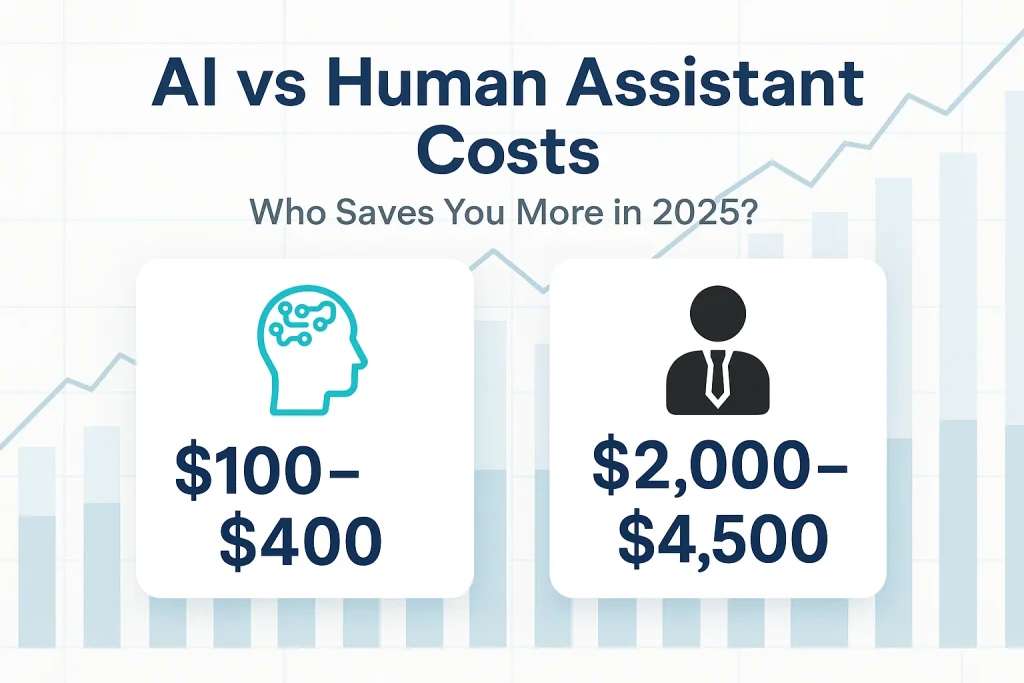The real estate world in 2025 is no longer business as usual. Agents and brokers are now asking: Should I hire a human real estate assistant or invest in an AI real estate assistant? Both options come with unique benefits and limitations. While AI excels at speed, automation, and cost efficiency, human assistants shine in complex negotiations, licensed tasks, and building trust. For most teams, the hybrid model—AI plus human—is proving to be the ultimate win.
1. One-Screen Verdict (Executive Summary)
| Option | Best When | Limitation |
|---|---|---|
| AI Assistant | Speed-to-lead, 24/7 coverage, scheduling, repetitive follow-ups | Cannot handle licensed tasks or complex negotiations |
| Human Assistant | Licensed tasks, negotiations, on-site activities, rapport | Higher costs, limited hours |
| Hybrid | Combines speed + trust | Requires sync between both |
2. What Does a Real Estate Assistant Do?
A real estate assistant is a professional or tool that helps agents manage daily operations. Their responsibilities range from scheduling showings to managing CRMs, handling paperwork, and even drafting content.
Common Real Estate Assistant Responsibilities:
| Responsibility | Human Assistant | AI Assistant |
|---|---|---|
| Scheduling appointments | ✅ | ✅ |
| CRM updates & data entry | ✅ | ✅ |
| Drafting emails & property descriptions | ✅ | ✅ |
| Licensed activities (showings, pricing) | ✅ | ❌ |
| Client rapport & trust-building | ✅ | ➖ |
As outlined by Salary.com, these roles can vary widely depending on job type, skill set, and whether the assistant is licensed. Increasingly, real estate virtual assistants and AI-driven helpers are filling the same space once occupied by in-office staff, becoming the ultimate real estate helper.
3. AI Real Estate Assistant
The AI real estate assistant is no longer futuristic—it’s mainstream.
Key Capabilities:
- Speed-to-lead: instant replies in under 60 seconds
- 24/7 coverage: never misses a weekend or late-night inquiry
- Automated scheduling & reminders
- CRM data entry and hygiene
- Drafting property descriptions, emails, and social posts
Limitations:
- Cannot perform licensed activities (showings, pricing advice)
- Struggles with nuanced negotiations or emotional rapport
- Requires oversight to avoid robotic tone
Typical cost: $100–$400/month, making AI attractive for solo agents or small brokerages.
Modern AI real estate assistants often integrate with CRMs, as seen in the Structurely + Follow Up Boss case study. For broader options, OneAI lists the top AI tools transforming real estate.

4. Human Real Estate Assistant
Despite automation, the human role is far from obsolete.
Strengths of Human Assistants:
- Licensed tasks: conducting showings, preparing contracts, and offering pricing advice
- Negotiation & strategy: humans understand context and emotions better
- Client trust: buyers and sellers value warmth and empathy
- On-site responsibilities: putting up signs, staging, or handling last-minute issues
Challenges:
- Higher costs: real estate assistant jobs average $2,000–$4,500/month, excluding bonuses
- Limited working hours (no 24/7 coverage)
For many, a commercial real estate virtual assistant or licensed assistant remains essential for high-value transactions.
5. Decision Matrix: AI vs Human Assistant
| Capability | AI Assistant | Human Assistant | Notes |
|---|---|---|---|
| Speed-to-lead (<60s) | ✅ | ➖ | AI wins nights/weekends |
| 24/7 coverage | ✅ | ➖ | AI never fatigues |
| Scheduling & reminders | ✅ | ✅ | AI automates, humans cover edge cases |
| Lead qualification | ✅ | ✅ | Human adds nuance |
| Licensed activities | ❌ | ✅ | State rules apply |
| Negotiation strategy | ➖ | ✅ | Human judgment key |
| Content drafting | ✅ | ✅ | AI drafts, human polishes |
| Data entry/CRM | ✅ | ✅ | AI cleans, human QA |
| On-site tasks | ❌ | ✅ | Physical presence needed |
| Client rapport | ➖ | ✅ | Human warmth wins |

6. Cost & ROI: Crunching the Numbers
| Option | Monthly Cost | ROI Potential |
|---|---|---|
| AI Assistant | $100–$400 | High efficiency, extra closings from faster replies |
| Human Assistant | $2,000–$4,500 | Stronger client trust, licensed tasks |
| Hybrid | ~$2,200–$4,800 | Balanced: automation + human connection |
ROI Sketch:
Faster responses mean more deals—even one extra closing/quarter can outweigh costs
Hours freed/month × your effective $/hr = value recovered
According to Glassdoor, salaries for human real estate assistants often fall between $30,000–$60,000 annually, while AI tools cost significantly less each month.

7. Hybrid Model: The Winner
The smartest approach is not AI vs human but AI + human.
Division of Labor:
| Task Type | AI Assistant | Human Assistant |
|---|---|---|
| Lead capture & instant reply | ✅ | ❌ |
| Appointment confirmations | ❌ | ✅ |
| Qualifying questions | ✅ | ➖ |
| Negotiation & pricing | ❌ | ✅ |
| Paperwork & compliance | ❌ | ✅ |
| CRM hygiene | ✅ | ✅ |
A weekly 20-minute sync ensures smooth workflows and quick adjustments.
8. Three High-Impact Workflows You Can Steal
| Workflow | AI Role | Human Role |
|---|---|---|
| Speed-to-Lead | Greet, qualify, offer time slots | Review pipeline, confirm details |
| No-Show Saver | Automated reschedule text, CRM update | Follow-up if client unresponsive |
| Listing Q&A | AI answers top 20 FAQs (schools, HOA, days on market, or even cheap 1 bedroom apartments ) | Handle pricing/strategy questions |
9. Compliance & Risk Management
| Area | AI Assistant | Human Assistant | Notes |
|---|---|---|---|
| Licensed tasks | ❌ | ✅ | State laws apply |
| Opt-in/consent | ✅ | ✅ | Both must follow regulations |
| CRM record-keeping | ✅ | ✅ | Essential for audits |
| Pricing/legal advice | ❌ | ✅ | AI must hand off to humans |

10. KPIs to Measure Success
| KPI | AI Benchmark | Human Benchmark |
|---|---|---|
| First reply time | <60 seconds | 1–12 hours |
| Lead-to-appointment rate | 25–40% | 25–40% |
| Show-up rate | 65–85% | 65–85% |
| Hours saved | 20–40/month | Depends on workload |
| CRM data completeness | >95% | >95% |
11. Common Objections (with Crisp Answers)
| Objection | Answer |
|---|---|
| “Will it feel robotic?” | Train AI tone + set human handoff at friction points |
| “Does AI replace my team?” | No—AI scales volume; humans win trust |
| “What if it breaks?” | Weekly reviews + escalation rules prevent issues |
12. Quick Checklist: Choose in 30 Seconds
| Scenario | Best Option |
|---|---|
| Need nights/weekends coverage | AI Assistant |
| Losing leads from slow replies | AI Assistant |
| Heavy negotiations/complex files | Human Assistant |
| Want efficiency + trust | Hybrid |
13. CTA Ideas That Convert
| CTA | Purpose |
|---|---|
| “See the hybrid in action: install AI chat + booking in 15 minutes, then assign one human owner for warm leads this week.” | Quick adoption |
| “Start with one workflow (speed-to-lead). Add showings and nurture after 14 days.” | Gradual onboarding |
Conclusion
The debate isn’t really Real estate ai assistant vs human assistant. it’s about choosing the right mix. AI boosts efficiency, ensures no lead slips through, and lowers costs. Human assistants add trust, empathy, and licensed expertise. Together, they form the hybrid model that wins in real estate—giving agents the speed of technology and the warmth of human touch.
FAQs
Q1. How much do real estate assistants make?
- Salaries for real estate assistant jobs vary from $30,000–$60,000/year depending on experience, location, and whether they are licensed.
- Commercial real estate virtual assistants and AI tools cost less but handle fewer complex tasks.
Q2. What is the highest paid real estate assistant?
- Licensed assistants, especially those in commercial real estate, are among the highest paid, often earning $70,000+ annually.
- Their ability to handle negotiations, paperwork, and compliance makes them indispensable.
Q3. What is the best AI tool for real estate?
- The best AI real estate assistant tools are those that integrate directly with your CRM, provide instant speed-to-lead responses, and offer scheduling automation.
- Popular categories include AI chatbots, SMS automation platforms, and virtual scheduling assistants.
- The “best” tool depends on your needs:
- For lead capture and instant replies → AI chat assistants with property FAQs.
- For scheduling and reminders → AI calendar and SMS tools.
- For full workflow automation → Hybrid AI platforms that combine CRM logging, auto-tagging, and appointment booking.







